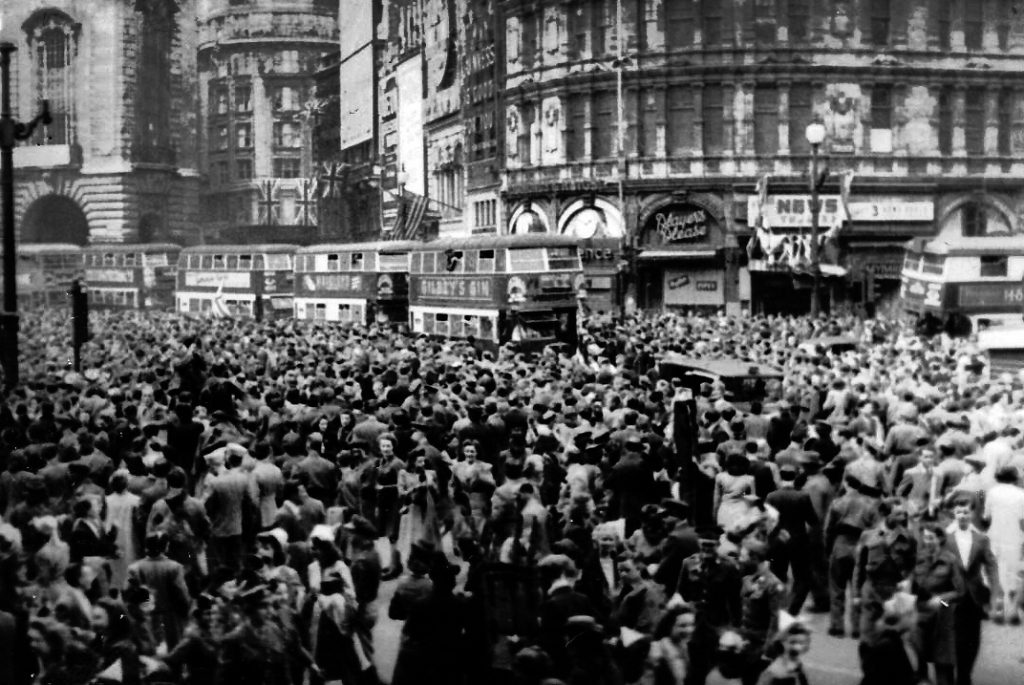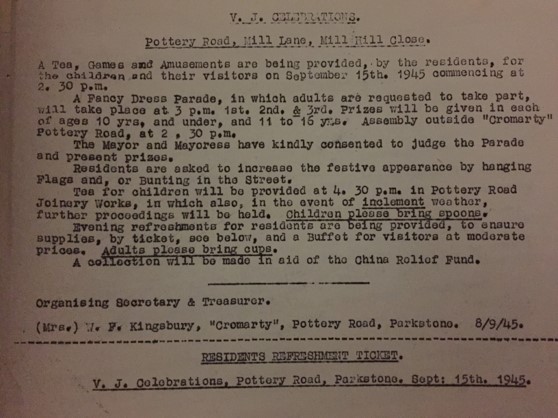With the 75th anniversary of VE Day upon us, we asked The Keep Military Museum to write a short piece about how Dorset celebrated the end of the war in 1945…
—
When post-war generations think of V.E. Day, images of street parties, celebrations in London, and the famous story of Princesses Elizabeth and Margaret anonymously immersed within the celebrating crowds immediately spring to mind. After such an active role in the war, did the people of Dorset take to the streets in the same way?

It seems the royals weren’t the only revellers escaping their usual confines to partake in the moment they’d waited six long years for; Patricia Connop, billeted in Bournemouth with the WRAF, told a similar story. Despite the billets being locked
“Some of the RAF boys … got a ladder and put it up to the window. There was about 12 of us who climbed out … We were all in our pyjamas and partied in the square in Bournemouth all night.”
Unlike the princesses, Patricia and her fellow escapees were “reprimanded but got away with it”.
It wasn’t just those in the Forces who were expected to ‘turn up as usual’. Can you imagine the faces of children that morning being told to attend school? Many were expected to do just that! St. Nicholas School in Broadwey, Weymouth, were like the majority, holding an assembly and short service before finally being dismissed for two days. Those faces – some of whom were evacuees who knew this meant they could finally return home – will have definitely changed for the better.
Along the coast from Weymouth, another town that played an active role in the war, Swanage, received the news with aplomb. Headlines after the national holidays reported: ‘Swanage Streets Crowded, Beflagged And Carpeted With Confetti’. Operation Sea Lion, the intended invasion of the British Isles, as well as nearby D-Day rehearsal, Operation Smash, were very real fears and experiences for the Purbeck residents; who can blame them for such relief and celebration?
Smaller villages were also involved with national celebrations. The BBC reported V.E. Night coverage from Piddletrenthide, painting the most Dorset of scenes: “The landlord [of The New Inn] and his wife are serving pints as fast as they can draw them.” To be fair, with street parties catered for on rations, and delicacies such as dripping sandwiches and eggless fruitcakes firmly on the menu, who can blame anyone for heading straight to their local for a pint instead?
It’s easy to think that after such V.E. Day celebrations, the surrender of Japan three months later wouldn’t be met with quite the same level of enthusiasm. However, in Bournemouth reports estimated: ‘15,000 gathered in Westover Road to listen to a broadcast by King George VI’, followed by another two days of equally fervent festivities.

While celebrating the end of the second world conflict in living memory (with the Great Depression sandwiched between for good measure), was obviously justified, it’s easy to lose sight of the mixed emotions those festivities would have created. A.H. Trelawny-Ross, a housemaster at Sherborne School, put it eloquently:
“I have known so well these splendid boys who have fallen, have no heart for merry-making, though thankful beyond words that so many have been spared”.
I’m sure this was echoed by every one in the celebrating crowds across Dorset and the nation, and remains in our thoughts as we commemorate this important anniversary.
Written by Michelle Homer.

